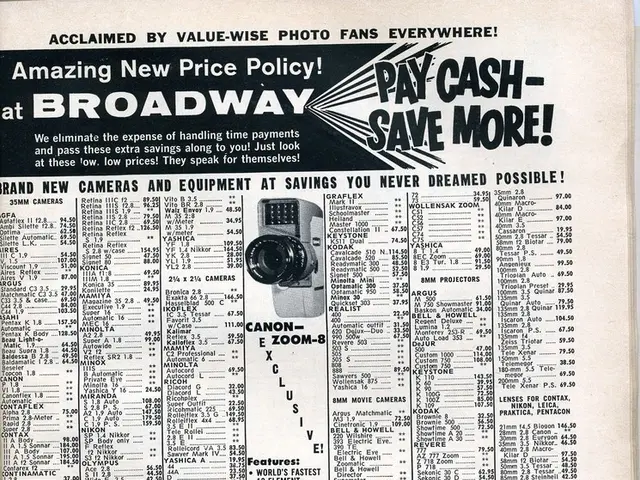Japanese Authorities Propose Wide-Ranging Actions against Unlawful Internet Gambling Sites
Gambling Frenzy in Japan: Gov't Aims to Curb Online Casinos
- 3.3 million Japanese defy online casino ban The Japan Times*
- Legislation looms to prohibit affiliate marketing, strengthen ISP responsibilities
In the face of a surge in gambling addicts and illegal activities linked to online casinos, the Japanese government is pondering stringent measures against these illicit gambling platforms. This includes discussing blocking these sites and reviewing a central framework law against gambling addiction [The Japan News] (https://bit.ly/3tTRcJE).
At the end of April 2025, the Ministry of Internal Affairs and Communications organized an expert panel to deliberate the feasibility of blocking online casino sites. This measure aims to prevent access to unlawful online casinos.
The ruling Liberal Democratic Party (LDP) also plans to revise the primary framework law to combat gambling addiction. Proposed revisions include making internet service providers legally obligated to refuse promoting illegal online casinos. Affiliate sites specializing in directing users to gambling portals will also be banned. Additionally, credit card payments to certain providers and youth protection filter software will be strengthened [Sumikai] (https://bit.ly/3UMrR3U).
Millions defy ban - addiction alarm bells
According to the National Police Agency, approximately 3.37 million people in Japan participate in online casinos despite the ban, with an annual betting volume exceeding 1.2 trillion JPY (€7.6 billion) [The Japan Times] (https://bit.ly/3UMrR3U). Younger generations are disproportionately affected, with many unaware that participating in online casinos is illegal. A survey by Sumikai reported that 43.5% of respondents did not know that online casinos are banned in Japan, with 46% of those affected admitting to accumulating gambling-induced debts.
Moreover, over 60% of users have recognized their gambling addiction themselves. The ease of access to gambling via smartphones accelerates their descent into dependency and complicates efforts to quit [The Japan Times] (https://bit.ly/3UMrR3U).
*Head of the psychiatric department of the National Hospital Organization Kurihama Medical and Addiction Center, Takanobu Matsuzaki, explains: *
Constitutional hurdles in blocking
Technological solutions, such as the AI-based filter software i-FILTER developed by Digital Arts, aim to block access to gambling sites in the future. While similar measures have only been legally enforceable for child pornographic content, the expert panel is currently examining whether this is also possible for online casinos. An interim report on the feasibility of these measures is expected by summer 2025.
The primary obstacles involve constitutionally protected telecommunications secrecy that restricts internet service providers from inspecting data traffic [The Japan Times] (https://bit.ly/3UMrR3U). Previous blocking attempts failed at this point, leading to discussions about alternative measures, such as voluntary blocks by foreign providers or stronger international cooperation.
Comparing Country Approaches
While Japan deals with the blocking of illegal online casinos, other countries have already implemented aggressive measures. Many Western states rely on targeted blocking in combination with payment and advertising restrictions.
A country comparison reveals:
- Germany: Since the introduction of the new Gambling State Treaty 2021, German authorities systematically block unlicensed providers using network blocking (DNS blocking) and collaborate with banks and payment service providers to interrupt payment streams [BMJV] (https://bit.ly/3UMmKuW).
- Austria: The Austrian gambling authority (GGL) employs IP and DNS blocking to block unlicensed providers. The Administrative Court has confirmed the legality of these blocks in 2019 [GGL] (https://bit.ly/3tTKaaf).
- United Kingdom: The Gambling Commission works with internet providers to block illegal sites via DNS blocking, monitors affiliate marketing, and demands cooperation from payment service providers to block suspicious transactions [UKGC] (https://www.gamblingcommission.gov.uk/for-the-public/what-you-need-to-know-about-gambling/licences-permits-and-registrations/selector/index.aspx).
- Norway: Internet service providers may block DNS addresses of illegal gambling sites upon the Norwegian regulatory authority's instruction since 2024 [Lotteritilsynet] (https://www.lotteritilsynet.no/english/), permitting only state-licensed providers like Norsk Tipping to operate.
- Denmark: In 2023, the Danish Gambling Authority Spillemyndigheden blocked 49 illegal providers, including sports betting and casino sites without a Danish license. The authority has blocked over 270 providers since 2012 and aggressively searches for new sites, using automation and public reports to regularly initiate legal action [Spillemyndigheden] (https://www.spillemyndigheden.dk/entreprenorer/internationalt-spil/).
- Australia: The Australian Communications and Media Authority (ACMA) continually monitors and publishes public lists of blocked providers, demanding cooperation from internet providers [ACMA] (https://www.acma.gov.au/the-acma/our-priorities/technology-and-innovation/illegal-offshore-gambling).
The Impact of Celebrity Scandals
The recent series of scandals involving celebrities and professional athletes implicated in online gambling, such as comedians from the Yoshimoto Kogyo agency and several baseball players, have significantly intensified the pressure on authorities to tackle the issue of illegal online casinos.
- The surge in online gambling in Japan is causing a rise in gambling addicts and illegal activities linked to online casinos.
- The Japanese government is considering stringent measures to combat these illicit platforms, including blocking access to them.
- The Liberal Democratic Party plans to revise the primary framework law to strengthen ISP responsibilities and ban affiliate marketing.
- Approximately 3.37 million people in Japan participate in online casinos, with an annual betting volume exceeding 1.2 trillion JPY (€7.6 billion).
- Younger generations are disproportionately affected, with many unaware that participating in online casinos is illegal.
- A survey reported that 43.5% of respondents did not know that online casinos are banned in Japan, with 46% of those affected admitting to accumulating gambling-induced debts.
- Over 60% of users have recognized their gambling addiction themselves.
- The ease of access to gambling via smartphones accelerates dependency and complicates efforts to quit.
- Technological solutions, such as AI-based filter software, aim to block access to gambling sites.
- Constitutional hurdles in blocking, namely telecommunications secrecy, are restricting internet service providers from inspecting data traffic.
- Countries like Germany, Austria, the United Kingdom, Norway, Denmark, and Australia have already implemented aggressive measures to regulate online casinos.
- Germany uses DNS blocking and collaborates with banks and payment service providers to interrupt payment streams.
- Austria employs IP and DNS blocking to block unlicensed providers.
- The United Kingdom works with internet providers to block illegal sites via DNS blocking and demands cooperation from payment service providers.
- Norway only permits state-licensed providers to operate.
- Denmark blocked 49 illegal providers, including sports betting and casino sites without a Danish license.
- Australia publishes public lists of blocked providers and demands cooperation from internet providers.
- The recent series of scandals involving celebrities and professional athletes implicated in online gambling has intensified pressure on authorities to tackle the issue.
- The impact of these scandals, coupled with the increase in problem gambling and illegal activities, highlights the need for stricter regulations and education about responsible gambling.









